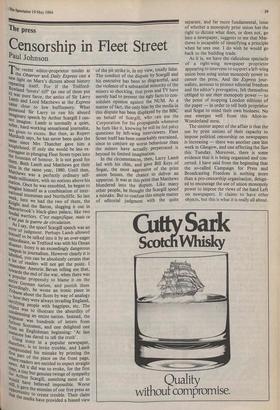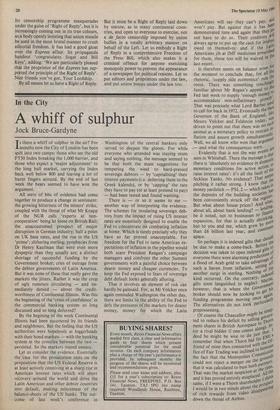Censorship in Fleet Street
Paul Johnson
The recent editor-proprietor tussles at the Observer and Daily Express cast a new light on Marx's dictum about history repeating itself. For if the Trelford- Rowland 'lovers' tiff' (as one of them put it) Was pure farce, the antics of Sir Larry Lamb and Lord Matthews at the Express came close to low buffoonery. What Possessed Sir Larry to run his absurd Imaginary speech by Arthur Scargill I can- not imagine. Lamb is normally a quiet, sober, hard-working sensational journalist, not given to excess. But then, as Rupert Murdoch says, he has never been quite the same since Mrs Thatcher gave him a knighthood. If only she would be less into in plunging Fleet Street types nto the fountain of honour. It is not good for enl. Both Lamb and Matthews got their titles in the same year, 1980. Until then, Matthews was a perfectly ordinary self- made millionaire, with no notions above his station. Once he was ennobled, he began to Imagine himself as a combination of inter- national statesman and Northcliffe. So last week, here we had the two of them, the might and the Baron, slugging it out in neaverbrook's black-glass palace, like two feudal warriors. C'est magnifique, mats ce nest pas la guerre de circulation. As I say, the spoof Scargill speech was an error L of judgment. Perhaps Lamb allowed tinnself to be talked into it by an over-eager subordinate, as Trelford was with his Oman disaster. Irony is an exceedingly dangerous ,weaPon in journalism. However clearly it is You can be absolutely certain that la lot of readers will not get the point. I !Member Aneurin Bevan telling me that, `anwards the end of the war, when there was P.oPular propensity to blame it on the aet.une ioreGngeriman nation, and punish them rdi Tribune Y, he wrote an ironic piece in about the Scots by way of analogy ter how they were always invading England,
5 people with bagpipes, etc. The
ucIn.lect was to illustrate the absurdity of te,„...dernning an entire nation. Instead, the irinse was hundreds of letters from il:nous Scotsmen, and one delighted one soonl an Englishman beginning: 'At last
ni,e.one has dared to tell the truth'.
th using irony invite popular newspaper, jerefore, is to trouble, and Lamb finnPounded his mistake by printing the sr Part of the piece on the front page, nwenere readers are entitled to expect straight ti_ws• All it did was to evoke, for the first f,ue, a tiny but genuine twinge of sympathy for Arthur Scargill, somthing most of us stinuld. have believed impossible. Worse op,ortugave the enemies of our free press an t nitY to create trouble. Their claim that the media have provided a biased view of the pit strike is, in my view, totally false. The conduct of the dispute by Scargill and his executive has been so disgraceful, and the violence of a substantial minority of the miners so shocking, that press and TV have merely had to present the ugly facts to con- solidate opinion against the NUM. As a matter of fact, the only bias by the media in this dispute has been displayed by the BBC on behalf of Scargill, who can use the Corporation for his propaganda whenever he feels like it, knowing he will be fed patsy questions by left-wing interviewers. Fleet Street itself has been remarkably restrained, since to conjure up worse behaviour than the miners have actually perpetrated is beyond its limited imagination.
In the circumstances, then, Larry Lamb led with his chin, and gave Bill Keys of Sogat, the most aggressive of the print union bosses, the chance to deliver an uppercut. It was at this point that Matthews blundered into the dispute. Like many other people, he thought the Scargill spoof a mistake. But to confuse this simple matter of editorial judgment with the quite separate, and far more fundamental, issue of whether a monopoly print union has the right to dictate what does, or does not, go into a newspaper, suggests to me that Mat- thews is incapable of identifying a principle when he sees one. I do wish he would go back to the building trade.
As it is, we have the ridiculous spectacle of a right-wing newspaper proprietor appearing to intervene to support a left-wing union boss using union monopoly power to censor the press. And the Express jour- nalists, anxious to protect editorial freedom and the editor's prerogative, felt themselves obliged to use their monopoly power — to the point of stopping London editions of the paper — in order to tell both proprietor and Sogat to mind their own business. No one emerges well from this Alice-in- Wonderland mess.
The sinister aspect of the affair is that the use by print unions of their capacity to impose political censorship on newspapers is increasing — there was another case last week in Glasgow, and one affecting the Sun this Tuesday. Moreover, there is some evidence that it is being organised and con- certed. I have said from the beginning that the so-called Campaign for Press and Broadcasting Freedom is nothing more than a pro-censorship organisation, design- ed to encourage the use of union monopoly power to impose the views of the hard Left on newspapers. It claims to have other objects, but this is what it is really all about. Its censorship programme masquerades under the guise of 'Right of Reply', but it is increasingly coming out in its true colours, as a body openly insisting that union muscle be used in the most brutal manner to crush editorial freedom. It has had a good gloat over the Express affair. Its propaganda handout 'congratulates Sogat and Bill. Keys', adding: 'We are particularly pleased that the proprietor of the Express has sup- ported the principle of the Right of Reply'. Nice friends you've got, Your Lordship.
By all means let us have a Right of Reply.
But it must be a Right of Reply laid down by statute, as in many continental coun- tries, and open to everyone to exercise, not a de facto censorship imposed by union bullies in a totally arbitrary manner on behalf of the Left. Let us embody a Right of Reply in a comprehensive Freedom of the Press Bill, which also makes it a criminal offence for anyone exercising monopoly power to prevent the appearance of a newspaper for political reasons. Let us put editors and proprietors under the law, and put union bosses under the law too.















































 Previous page
Previous page